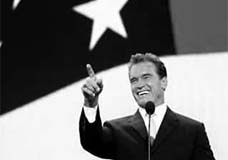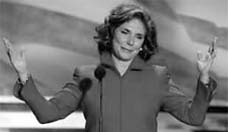
Oman RPCV Delinda C. Hanley says Bush and Kerry May Regret Ignoring Concerns of Muslim-, Arab-American Voters
Bush and Kerry May Regret Ignoring Concerns of Muslim-, Arab-American Voters
By Delinda C. Hanley
Independent presidential candidate Ralph Nader (l) and CAIR executive director Nihad Awad at a Capitol Hill conference on “The Muslim Vote in Election 2004.” (staff photo D. Hanley).
AS THEY COURT the Jewish-American vote, President George W. Bush and Sen. John Kerry ignore a far bigger prize. so long as the economy continues to grow and there are no new terrorist attacks inside the United States, Muslim- and Arab-American voters will cast their votes for the candidate who best addresses their primary concerns: the conflicts in the Middle East and civil rights abuses at home.
On June 29 at the Rayburn House Office Building on Capitol Hill, The Council for the National Interest (CNI) and the Council on American-Islamic Relations (CAIR) co-hosted a panel discussion on “The Muslim Vote in Election 2004.” Neither the Bush nor Kerry campaign sent a representative, making it quite obvious that this voting bloc is not yet on their radar screens. Independent candidate Ralph Nader came personally to address the standing-room-only audience and C-SPAN viewers and listeners.
Campaign strategists for Bush and Kerry may regret that they did not pay greater attention to some critical numbers. According to 2001 census reports, Americans number 285 million. Of these, 84 percent identify themselves as Christian and 2.5 percent as Jewish, with the rest claiming another faith. While the 2000 Census counted only 1.25 million persons who self-identify as having an Arabic-speaking origin, the Arab American Institute estimates the population at more than 3.5 million (based on research done by the Zogby International polling and marketing firm).
These 3.5 million Americans of Arab descent may be Catholics (42 percent), Protestants (12 percent), Orthodox Christians (23 percent), or Muslims (23 percent). According to a 2000 Zogby International poll, 88.5 percent of Arab Americans are registered to vote. They are more politically active and vote in greater percentages—62 percent in 1996—than average Americans. During the 2000 election campaign, 14.5 percent of Arab Americans contributed financially to a presidential campaign and 82 percent watched a presidential debate.
According to CAIR, Muslim Americans total seven to eight million, and 60 percent of them are registered to vote. An ethnically diverse population, 39 percent are of South Asian descent, 27 percent African American, 17 percent Arab, 11 percent Central Asian, 4 percent African, and 2 percent white Americans.
Muslim- and Arab-American organizations separately issue statements and conduct polls without much consideration for the overlap—i.e., Muslim Arab Americans. If 23 percent of 3.5 million Arab Americans are Muslim, there are 805,000 Muslim Arab Americans—leaving 2,695,000 non-Muslim Arab Americans. Adding those latter to CAIR’s low estimate of seven million American Muslims (the country’s fastest growing religious group, it should be noted) gives a combined total of 9,695,000 Muslim and Arab Americans.
Kerry and Bush would be well advised to compare this voting bloc to slightly more than 7 million Jews—many of whom do not support Israeli policies—and develop their platforms accordingly. Both candidates might also want to take into consideration the vast number of Jewish, Christian and African-American voters who share the concerns of this bloc, and who place a high priority on peace in the Middle East and civil rights at home.
On the whole, the U.S. media, campaign strategists, national pollsters (with the exception of Zogby) and even the U.S. Census Bureau purposefully ignore the numbers of Arab- and Muslim-Americans. While Jewish American voters, who traditionally vote Democratic, frequently are identified in news and exit polls, a discussion of the power of this newer bloc, its critical effect in the 2000 elections, and the impact it could have this November, is taboo.
This bloc played a key role in Bush’s 2000 election victory. After surveying the community and making overtures to both Bush and his opponent, Vice President Al Gore, the American Muslim Political Coordinating Council Political Action Committee (AMPCC-PAC), comprising the four major American-Muslim organizations—the American Muslim Alliance (AMA), American Muslim Council (AMC), CAIR, and Muslim Public Affairs Council (MPAC), recommeded that its members vote for Bush.
According to CAIR figures, that recommendation resulted in 78 percent of Muslims voting for George W. Bush. In Florida, the most crucial state in the last elections, exit polls showed that 91 percent of the 60,000 Muslim Americans who voted supported Bush.
A record number—36 percent—of nationally polled Muslims were first-time voters.
This year the American Muslim Taskforce on Civil Rights and Elections (AMT) has been established by the above-mentioned major Muslim organizations, minus AMC, which has closed its doors. Also joining the AMT is the Islamic Circle of North America (ICNA), the Islamic Society of North America (ISNA), Muslim Alliance of North America (MANA), Muslim American Society (MAS), Muslim Student Association-National (MSA-N), and Project Islamic Hope (PIH).
While not part of the alliance of Muslim organizations, the Arab American Institute, the American-Arab Anti-Discrimination Committee, and other Arab-American organizations can generate a lot of support among their constituents for favored candidates.
A Zogby International poll found that, in 2000, 45.5 percent of Arab (vs. Muslim) Americans voted for Bush, 38 percent for Gore and 13.5 percent for Ralph Nader. The latest Zogby poll found that 27 percent of Arab-American voters back Bush, 43 percent Kerry, and 20 percent Nader. This should be of interest to each party, according to AAI President Dr. James Zogby. “Because Arab Americans are a reliable voter group who go to the polls in larger percentages than other groups,” he explained, “they could deliver the difference for candidates who listen to their concerns,”
An early June CAIR poll of Muslims who had voted for Bush in 2000 found that 50 percent planned to vote for Kerry, 26 for Nader, only 3 percent for Bush, with the rest not yet sure. CAIR’s executive director Nihad Awad told the Capitol Hill audience that Muslim-American organizations will decide whether to endorse a particular candidate, or recommend that Muslim Americans just vote their conscience, in mid-October.
Because of their non-profit status, CAIR and other American Muslim groups cannot actually endorse or raise funds for a candidate, Awad noted, which is why they joined together to form AMT. Stating that Kerry had met with Arab Americans in Michigan, Awad said the Democratic candidate had made some positive statements on some important issues. Nevertheless, he added, Muslim voters would like Kerry to be a better candidate.
Awad predicted there would be 1.5 million registered Muslim voters by election day. They will select a candidate on the basis of his stance on civil rights, the PATRIOT Act, and foreign policy, as well as domestic issues like the economy, security, employment, health care and education.
Four hotly contested battleground states in the 2004 elections contain sizable Arab- and Muslim-American communities: Michigan, Florida, Ohio and Pennsylvania. In these four states, Arab Americans (not including Muslims not of Arab origin) represent a likely voter turnout of more than 510,000 voters (235,000 in Michigan, 120,000 in Florida, 85,000 in Ohio and 75,000 in Pennsylvania). The Arab-American vote represents slightly more than 5 percent of the overall vote in Michigan, 2 percent in Florida, just under 2 percent in Ohio, and more than 1.5 percent of all Pennsylvania voters, according to Zogby International polls conducted for the Arab American Institute.
While Americans may say religion or ethnic origin should not play a role in elections, religion has long played a role in politics—and specifically in presidential elections. Democratic presidential nominee John F. Kennedy’s Catholicism was an issue for voters in 1963. At that time, the divide between Catholic voters and Protestant voters was clear: 75 percent of Catholics voted for Kennedy and 75 percent of Protestants voted for Richard Nixon, the Republican nominee.
Religion’s Role in U.S. Politics
According to the June 16, 2004 edition of Election Focus 2004, a newsletter produced by the U.S. Department of State (<http://www.usembassy.de/mail>), “The contemporary role of religion in politics has evolved from being an issue of the candidate’s religious affiliation to a matter of voters’ religious preferences and what that indicates about their views on specific political issues. A March 2004 Gallup Poll found that 64 percent of registered voters say their personal religious beliefs and faith will be important in deciding their votes for the president this year. With this in mind, both Republican and Democratic parties have made religious outreach a key component of their campaigns.”
Catholics and Evangelical Protestants have received the most attention. Kerry is the first Catholic candidate since the late President Kennedy (and has discovered a Jewish grandfather, which can only help). While a little more than 20 percent of voters are Catholic, only 32 percent of them say their religious beliefs occasionally or frequently guide their voting decision, according to a poll conducted by the Pew Forum on Religion and Public Life. The same study, however, found that more than two-thirds of those who consider themselves Evangelical Protestants say their religious beliefs affect their voting decision. Of those who oppose abortion, gay marriage and stem cell research, 70 percent are in favor of Bush’s re-election.
Both candidates also are courting the Jewish vote. According to a July 2, 2004 New York Times article, “Kerry recasts Mideast stance to woo back Jewish voters,” in a new policy paper the Massachusetts senator strikes a decidedly stronger pro-Israel position than he did a few months ago, as he attempts to enlist the support of Jewish voters who have been gravitating to President Bush and away from their tradition of voting Democratic in presidential elections.
Kerry is working to present pro-Israel credentials as strong, if not stronger, than Bush’s. His recent position paper, “Strengthening Israel’s Security and Bolstering the U.S.-Israel Special Relationship,” goes so far as to say, “Israel’s cause must be America’s cause.”
This paper includes the statement, “John Kerry has been at the forefront of the fight for Israel’s security during his 19 years in the U.S. Senate.” It adds, “His pro-Israel voting record is second to none.”
In the policy paper, which has not been made public, Kerry outlines his positions on several issues important to the American Jewish community, ignoring the views of the Arab and Muslim Americans. According to the Times, “He calls for more forceful action to prevent Iran from gaining nuclear weapons, fully backs Israel’s construction of a barrier between Israel and the Palestinian territories in the West Bank and pledges to work to push for a new Palestinian political class to replace Yasser Arafat, who is called a ‘failed leader.’”
Kerry irritated some Jewish groups last October, when he referred to Israel’s wall as a “barrier to peace.” The new position paper calls it “a security fence” and says building it is “a legitimate right of self-defense” and “not a matter” to be taken up by the International Court of Justice, which recently ruled against the wall.
Jewish groups also attacked Kerry’s proposal to appoint as special peace negotiator James Baker III, secretary of state in the first Bush administration, whom they accused of making anti-Israel statements. The new paper, drafted by policy and political advisers, does not say whom Kerry would pick for that role should he be elected.
Republican political strategists hope that President Bush’s record will entice Jewish voters away from the Democratic Party. Bush’s unprecedented, unwavering support for Israel, the war on Iraq, and what seems to have become a war on Islamic terrorism could gain some support from the Jewish community in November. However, his religiosity, his stance on abortion, gay rights, and stem cell research should make it very difficult for most Jewish voters to pull that—these days metaphorical—voting lever.
Kerry supporters hope he will listen to their concerns. Although they see him as a worldly coalition builder, not a cowboy out to overthrow regimes, they’re disheartened that Kerry hasn’t tried harder to win their votes. Traditionally, after all, the overwhelming majority of Jewish voters have backed the Democratic nominee—in 2000, just 17 percent of the Jewish vote went to Bush—so he should not need to pander.
There is a growing temptation for Muslim and Arab Americans to cast a protest vote for Ralph Nader, who has become increasingly involved in the community. While he cannot win the election, he’s addressing their civil rights and foreign policy concerns and putting on the table every issue they care about.
It is highly unlikely, at any rate, that many Muslims and Arab Americans will support Bush to the degree they did in 2000, when he made promises to them. After 9/11, however, he eventually betrayed this bloc, and that is hard to forgive.
It would be a mistake for the Kerry and Bush campaigns to ignore or take for granted this strong potential voting bloc. Should they continue to do so, Muslim and Arab Americans, who are not wedded to any party, may cast their votes for Nader. In a tight race, they are a powerful swing vote that can ensure victory—or defeat—for either side.
Delinda C. Hanley is news editor of the Washington Report on Middle East Affairs.



